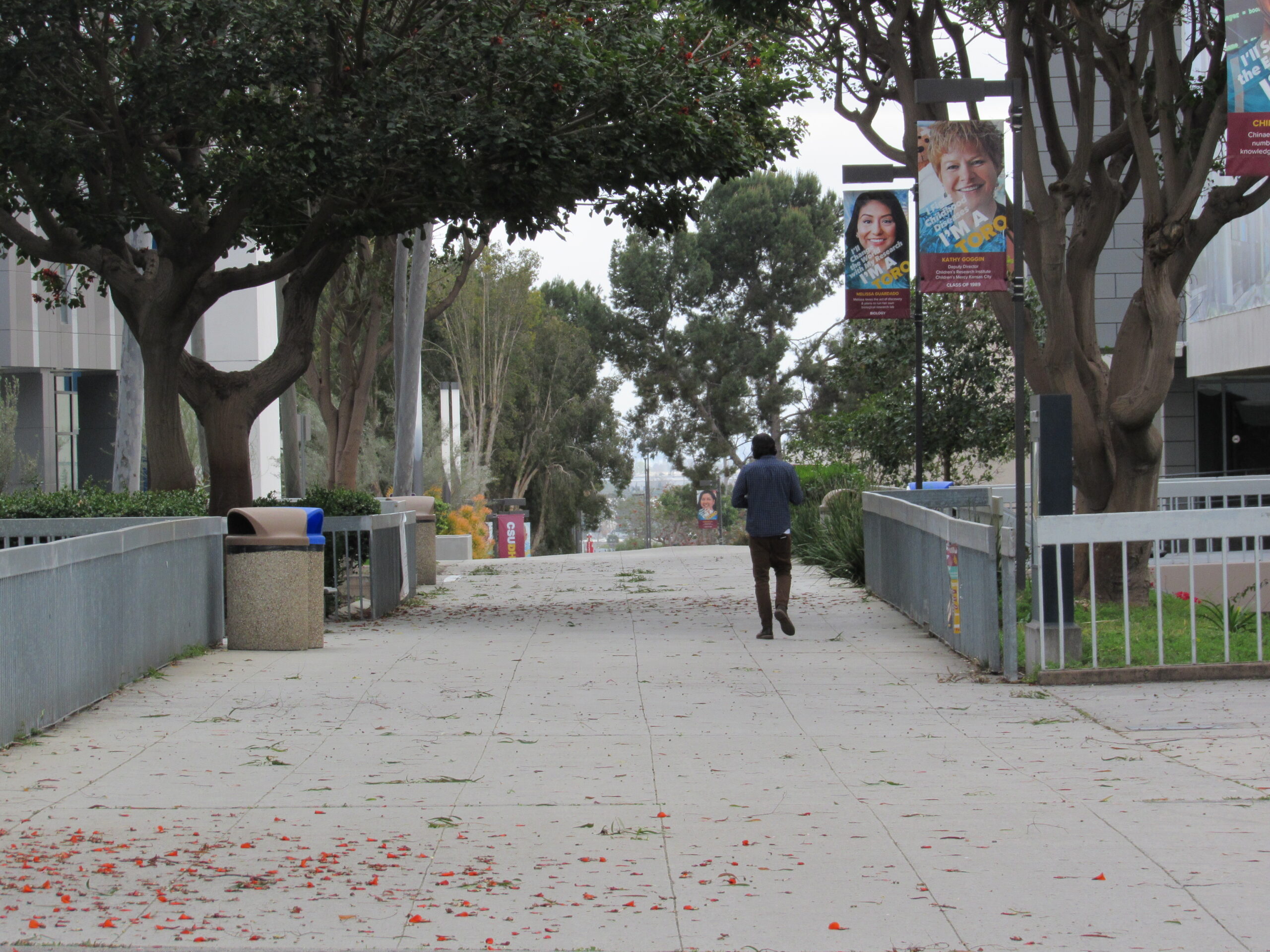Photo by Robert Rios.
By Destiny Torres, Arts and Entertainment Editor
In the days before the safer-at-home order was put in place, the walkways and buildings at California State University, Dominguez Hills were bustling with friends laughing, clubs tabling and procrastinators running to the printer stations.
Today, however, the halls are unusually quiet, the parking lots are hauntingly empty and the Loker Student Union is completely closed down.
And while the closure of campus means no more in-person classes, it also means no more in-person contact altogether.
The result? The new social distancing measures have had damaging impacts on the daily lives of many students. Through social media, students have confessed to staying up until 4 a.m. and sleeping in until 3 p.m. Other students have described a lack of motivation, anxiety and high-stress levels. The intense feelings of isolation and sadness that were derived from being in quarantine has caused many students to feel hopeless, especially those who are unable to be themselves at home.
According to Anna Liza Garcia, the assistant dean of students at CSUDH, a survey was taken by the Associated Students, Inc. Although only two percent of the student body answered, it was evident that students are mainly struggling financially. In the Office of Student Life, she has heard many stories of students feeling intense sadness.
Garcia said the OSL is trying to find ways to support the students with virtual hangouts, social media challenges and career preparedness workshops. She said she would like to see students reframe “social distancing” into “distant socializing.” Finding connectedness is the best way for students to get through these tough times.
“It’s so important right now to find your connection,” Garcia said. “It’s the connection that makes you feel affirmed and valued…because this is tough.”
For many, the way they participated in student life on campus was through clubs and organizations, but many student leaders have found it difficult to keep clubs engaged when the only source of interaction is through virtual meetings and conversations.
“School being the way it is, ruined our hopes of maintaining a relationship with our members,” John Otero, senior and president of the Toro Entertainment and Media Society (T.E.A.M.S), said.
Otero said everything being moved to online has made him feel stuck in terms of club business and his own school work.
Cynthia Blake, president of Scholars United, has created a group chat with the active club members where they message each other constantly and keep one another motivated.
“Not having a date to resume our lives is challenging,” Blake said. “We enjoy being on campus, so it’s very hard to keep the momentum.”
The Rose Black Resource Center (RBRC) hosts weekly check-ins every Thursday at 2 p.m. via Zoom. They have also hosted virtual Netflix parties and a virtual brunch.
“Many of the students we serve are mentally exhausted and ‘over’ virtual and online programming,” Catherine Jermany, the RBRC coordinator said. “Most of the narratives I hear from students is that they just want the semester to be over.”
Students working at the Queer Culture and Resource Center have created a grand amount of virtual ways for everyone to stay connected and events to participate in by using Zoom, social media, Discord, and even starting a book club.
“The biggest obstacle is not having a physical space,” Karama Blackhorn, QCRC coordinator said. “A lot of people are not out at home; Trans and queer folk need to pretend to be straight and cis.”
Mental health is the biggest concern when planning programs and activities. Blackhorn said that noticing how students weren’t sleeping well at home or were not taking care of themselves caused deep concern for their well-being, especially considering the fact that depression rates among LGBTQ+ people are devastatingly high.
As a result, members of the QCRC took command and created a Google Calendar full of ways that people can remain connected. Monday through Thursday everyone is welcome to participate in live feeds, video chats and questions of the day.
Peer wellness check-ins are available for students who need someone to talk to or want to find resources. Weekly, the QCRC hosts pop-ups on Zoom where students can pop in to hang out, study and play games, just as they would if the campus center were open.
Using the Discord program, students are able to chat on a number of channels whose topics range from Animal Crossing, music and astrology.
“We want to make sure people never feel alone,” Blackhorn said.
Students are forced to connect in different ways than they’re used to. In order to remain hopeful, maintaining contact with friends, loved ones and peers is crucial. It is not a matter of distancing yourself from society but of socializing from a distance.

